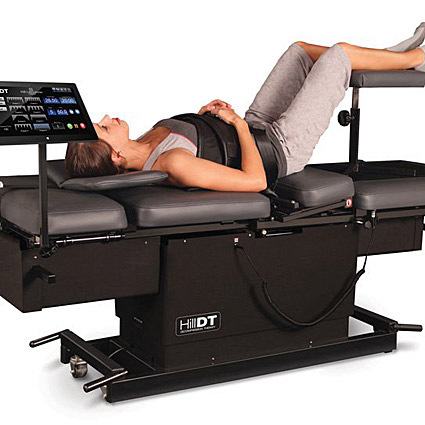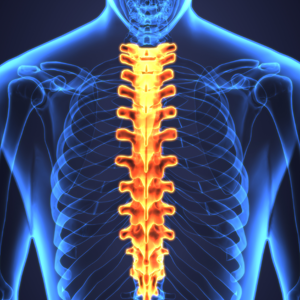Spinal Decompression in Canberra
 Spinal Decompression Therapy is a safe, non-surgical, and drug-free method for chronic neck and lower back conditions associated with disc herniation and joint degeneration. It works by gently lengthening the spine and releasing pressure within the discs, creating ideal conditions for healing.
Spinal Decompression Therapy is a safe, non-surgical, and drug-free method for chronic neck and lower back conditions associated with disc herniation and joint degeneration. It works by gently lengthening the spine and releasing pressure within the discs, creating ideal conditions for healing.
At Canberra Spine Centre, we use the Hill DT Spinal Decompression table—the industry-leading Decompression Table on the world market—and we’re the only practice in Canberra with one. It provides safe, reliable, and consistent care using an array of integrated sensors that continually monitor the patient, ensuring proper program delivery. Your chiropractor will choose from one or a combination of 8 different programs, adjusting the level of pull to your needs as you progress through your plan.

If you have—
- Bulging or herniated discs of the neck or lower back
- Degenerative joint disease and spondylosis
- Disc degeneration
- Facet syndrome
- Spondylosis
- Non-responsive chronic neck or back pain
The table produces a pumping motion that helps increase blood flow to the area, provide needed nutrients and oxygen into the disc and other joint-related tissues, decrease pressure inside the disc, reduce the size of the disc herniation and nerve compression, irritation and inflammation, and rehydrates the disc, creating healthier disc tissue. Clients may also see an improvement in spinal mobility.
FAQs
How Does Spinal Decompression Therapy work?
The repeated gentle stretching of the spine also assists in restoring proper motion to the surrounding joints and associated soft tissues, including those of the tough outer layer of the disc. This restored motion is vital to the health of the intervertebral joints and the intervertebral discs. Proper movement of any joint in the body helps to keep it supple, as well as promoting good blood flow and nutrition to keep the supportive tissues strong and healthy. For more detail, read the full article on this page.
How do I know if Spinal Decompression Therapy help me?
On your first visit, your chiropractor will perform a thorough history, screening chiropractic, orthopaedic and neurologic examinations, as well as x-rays if necessary. CT or MRI scans may also be ordered.
At the end of this visit, your chiropractor will advise if you are a suitable candidate for Spinal Decompression Therapy. If so, an appointment will be made for your Report of Findings on your second visit, where everything will be explained to you before any treatment is commenced. For more detail, read the full article on this page.
Does Spinal Decompression Therapy hurt?
Due to the stretching of scar tissue of the tissues in and around the joints, you may occasionally get an increase of pain during your decompression session, or shortly afterwards. This passing discomfort is common, and a sign of the table doing the work your body needs.
What success rate does Spinal Decompression Therapy have?
Is Spinal Decompression Therapy expensive?
At Canberra Spine Centre, we strive to make all our care affordable. The cost of each session is approximately the same fee we charge for a spinal adjustment with the chiropractor. Considering the length of the treatment and the cost of the equipment involved, this cost is very low. Clients in other countries, such as the USA, will often pay three times the amount we charge for the same treatment.
- Bulging or herniated discs of the neck or lower back
- Degenerative joint disease and spondylosis
- Disc degeneration
- Facet syndrome
- Failed back surgery
- Chronic neck or back pain that is not responding to other conservative therapies.
Are there conditions that make me unsuitable for Spinal Decompression Therapy?
The following conditions are contraindications for Spinal Decompression Therapy:
- Severe infections, such as meningitis.
- Spinal cancer.
- Severe disc conditions where pain or other symptoms are radiating to both arms or legs.
- Rheumatoid arthritis.
- Recent fractures.
- Severe osteoporosis.
- Abdominal pressure issues such as hiatus hernia or aortic aneurysm.
- Pregnancy.
- Cardiac or respiratory insufficiency.
- Decompression anxiety – some severe claustrophobes may not be comfortable on the Decompression Table.
- Joint hypermobility.
Your chiropractor would identify any of the above during the initial consultation and make the necessary recommendations at that point.
Can Spinal Decompression Therapy help me if other treatments have failed?
The same is often the case for failed back surgery – where surgery has been performed, and either the desired result has not been achieved, or a return to the previous condition occurs some time later.
While it cannot help in all these cases, Spinal Decompression Therapy is indicated in cases that have failure to respond to surgery or more conservative therapies.
Is Spinal Decompression Therapy an alternative to spinal surgery?
There are also other categories of disc herniation that are unlikely to respond to Spinal Decompression Therapy. Patients with these problems most likely will require surgery.
Your chiropractor will, after reviewing all examination findings and MRI scans, be able to advise you of which category you are in and refer back to your medical doctor to set an appropriate course of treatment for you.
More Information On Spinal Decompression Therapy
Learn More
Speak with one of our team members to learn more about the benefits of spinal decompression therapy and make an appointment to see if you’re a candidate. Call us today!
CONTACT US

